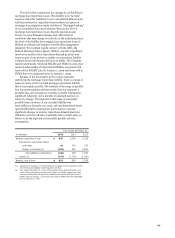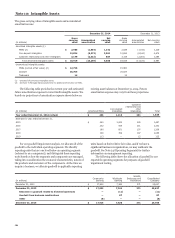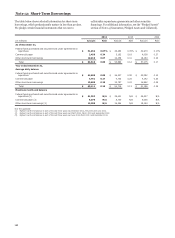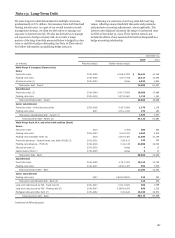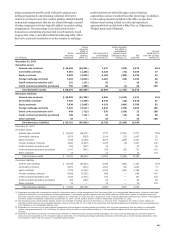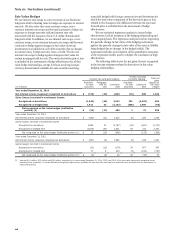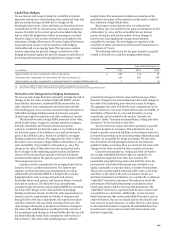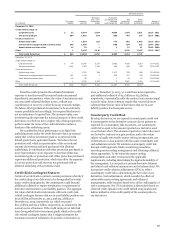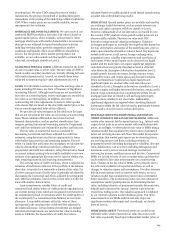Wells Fargo 2014 Annual Report Download - page 205
Download and view the complete annual report
Please find page 205 of the 2014 Wells Fargo annual report below. You can navigate through the pages in the report by either clicking on the pages listed below, or by using the keyword search tool below to find specific information within the annual report.
Note 15: Legal Actions
Wells Fargo and certain of our subsidiaries are involved in a
number of judicial, regulatory and arbitration proceedings
concerning matters arising from the conduct of our business
activities. These proceedings include actions brought against
Wells Fargo and/or our subsidiaries with respect to corporate
related matters and transactions in which Wells Fargo and/or
our subsidiaries were involved. In addition, Wells Fargo and our
subsidiaries may be requested to provide information or
otherwise cooperate with government authorities in the conduct
of investigations of other persons or industry groups.
Although there can be no assurance as to the ultimate
outcome, Wells Fargo and/or our subsidiaries have generally
denied, or believe we have a meritorious defense and will deny,
liability in all significant litigation pending against us, including
the matters described below, and we intend to defend vigorously
each case, other than matters we describe as having settled.
Reserves are established for legal claims when payments
associated with the claims become probable and the costs can be
reasonably estimated. The actual costs of resolving legal claims
may be substantially higher or lower than the amounts reserved
for those claims.
FHA INSURANCE LITIGATION On October 9, 2012, the United
States filed a complaint, captioned United States of America v.
Wells Fargo Bank, N.A., in the U.S. District Court for the
Southern District of New York. The complaint makes claims with
respect to Wells Fargo's Federal Housing Administration (FHA)
lending program for the period 2001 to 2010. The complaint
alleges, among other allegations, that Wells Fargo improperly
certified certain FHA mortgage loans for United States
Department of Housing and Urban Development (HUD)
insurance that did not qualify for the program, and therefore
Wells Fargo should not have received insurance proceeds from
HUD when some of the loans later defaulted. The complaint
further alleges Wells Fargo knew some of the mortgages did not
qualify for insurance and did not disclose the deficiencies to
HUD before making insurance claims. On December 1, 2012,
Wells Fargo filed a motion in the U.S. District Court for the
District of Columbia seeking to enforce a release of Wells Fargo
given by the United States, which was denied on February 12,
2013. On April 11, 2013, Wells Fargo appealed the decision to the
U.S. Court of Appeals for the District of Columbia Circuit. The
Court affirmed the denial of Wells Fargo's motion on June 20,
2014. Previous resolution discussions did not result in an
acceptable final agreement. The parties are again engaged in
discovery.
INTERCHANGE LITIGATION Wells Fargo Bank, N.A.,
Wells Fargo & Company, Wachovia Bank, N.A. and Wachovia
Corporation are named as defendants, separately or in
combination, in putative class actions filed on behalf of a
plaintiff class of merchants and in individual actions brought by
individual merchants with regard to the interchange fees
associated with Visa and MasterCard payment card transactions.
These actions have been consolidated in the U.S. District Court
for the Eastern District of New York. Visa, MasterCard and
several banks and bank holding companies are named as
defendants in various of these actions. The amended and
consolidated complaint asserts claims against defendants based
on alleged violations of federal and state antitrust laws and seeks
damages, as well as injunctive relief. Plaintiff merchants allege
that Visa, MasterCard and payment card issuing banks
unlawfully colluded to set interchange rates. Plaintiffs also allege
that enforcement of certain Visa and MasterCard rules and
alleged tying and bundling of services offered to merchants are
anticompetitive. Wells Fargo and Wachovia, along with other
defendants and entities, are parties to Loss and Judgment
Sharing Agreements, which provide that they, along with other
entities, will share, based on a formula, in any losses from the
Interchange Litigation. On July 13, 2012, Visa, MasterCard and
the financial institution defendants, including Wells Fargo,
signed a memorandum of understanding with plaintiff
merchants to resolve the consolidated class actions and reached
a separate settlement in principle of the consolidated individual
actions. The proposed settlement payments by all defendants in
the consolidated class and individual actions total approximately
$6.6 billion. The class settlement also provides for the
distribution to class merchants of 10 basis points of default
interchange across all credit rate categories for a period of eight
consecutive months. The Court granted final approval of the
settlement, which is proceeding. Merchants have filed several
“opt-out” actions.
MORTGAGE RELATED REGULATORY INVESTIGATIONS
Government agencies continue investigations or examinations of
certain mortgage related practices of Wells Fargo and
predecessor institutions. Wells Fargo, for itself and for
predecessor institutions, has responded, and continues to
respond, to requests from government agencies seeking
information regarding the origination, underwriting and
securitization of residential mortgages, including sub-prime
mortgages.
ORDER OF POSTING LITIGATION A series of putative class
actions have been filed against Wachovia Bank, N.A. and
Wells Fargo Bank, N.A., as well as many other banks,
challenging the high to low order in which the banks post debit
card transactions to consumer deposit accounts. There are
currently several such cases pending against Wells Fargo Bank
(including the Wachovia Bank cases to which Wells Fargo
succeeded), most of which have been consolidated in multi-
district litigation proceedings in the U.S. District Court for the
Southern District of Florida. The bank defendants moved to
compel these cases to arbitration under Supreme Court
authority. On November 22, 2011, the Judge denied the motion.
The bank defendants appealed the decision to the U.S. Court of
Appeals for the Eleventh Circuit. On October 26, 2012, the
Eleventh Circuit affirmed the District Court’s denial of the
motion. Wells Fargo renewed its motion to compel arbitration
with respect to the unnamed putative class members. On April 8,
2013, the District Court denied the motion and Wells Fargo
appealed the decision to the Eleventh Circuit. On February 10,
2015, the Eleventh Circuit vacated the order based on the
District Court's lack of jurisdiction until class certification has
been determined, and remanded to the District Court for further
proceedings.
On August 10, 2010, the U.S. District Court for the Northern
District of California issued an order in Gutierrez v. Wells Fargo
Bank, N.A., a case that was not consolidated in the multi-district
proceedings, enjoining the bank’s use of the high to low posting
method for debit card transactions with respect to the plaintiff
class of California depositors, directing the bank to establish a
different posting methodology and ordering remediation of
approximately $203 million. On October 26, 2010, a final
203


